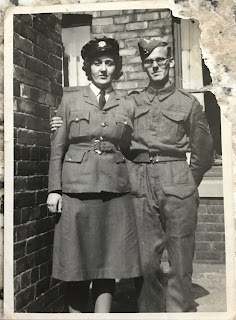With a Shovel and a Pick and a Little White Stick
 |
| Grandma & Grandad, c.1940-43 |
There are a lot of misconceptions about history. One that I frequently encounter regarding the two World Wars of the 20th century, is that men were either classified as fighting fit and sent to armed combat overseas, or classified unfit for service and stayed at home. I’ve never seen a historical drama that represents my Grandad’s experience in the Pioneer Corps during World War II.
Luckily, the family still has photos and documents from the time, which help tell his story. And I’m lucky to have Grandad’s own words, in the transcript of an interview I did for a school project in the 1980s.
So, here is the story of my Grandad, and many other men like him.
David Macrae Cumming was born in 1916 in Lochore, Fife, and moved with his family to Sunderland following the General Strike of 1926. He was an intelligent boy, who got a scholarship to grammar school, but was not allowed to take it up. As the eldest son, his father wanted him to work in the family hairdresser’s shop, and probably to take it over in time. That never happened.
The Second World War began on David’s 23rd birthday, 3rd September, 1939.
We listened to the radio in the morning and heard the announcement telling us we were at war with Germany. And we decided to build a temporary air raid shelter under the bed. The air raid warning went off at 11:00 and my mother said, “They can’t have come yet!” Fortunately they hadn’t - it was a false alarm. Someone had seen some seagulls over the south coast and thought it was a German plane!
 |
| David’s medical papers, 1940. |
 |
| David and his army pals |
Here, I learned a little bit of Italian. The first sentence being, “Una tazzina di te, per favore.” Which of course means, “A cup of tea please.” Next to a rifle, the soldier’s best friend!
Grandad’s interest in foreign languages was to last all his life. He would become fluent in Italian, French and German. Unlike some of his contemporaries, he had no hatred of the Germans. In fact, he served alongside Germans in our own army.
The Germans and Austrians who were in our army were refugees from the Nazi regime. Either political opponents or Jews. [NB: The Pioneer Corps was the only part of the army they were allowed to join.] One of them taught me how to play chess, an Austrian.
Chess would become another of my Grandad’s lifelong loves.
 |
| Invitation to a dance in Kent |
He did a similar thing in Kent. (Where he also apparently went to a dance, and danced with two girls called Muriel and Pat, according to the back of his dance card!) He also spent some of his war training other soldiers. He must have loved that, because he always longed to teach, but never could because of his lack of a grammar school education.
 |
| Invitation to a wartime wedding |
 |
| David & Madge’s wedding, 1943 |
By the time he married my Grandma, he had evidently been promoted to Corporal. They would never have met if not for the war. When he was first enlisted, David was sent to Belle Vue Barracks, Bradford (Thornton Grammar School’s brand-new building, which was requisitioned). My great-grandmother put on hospitality for soldiers, and it was through this that he met Marjorie (Madge) Wyatt, who was in the RAF, working with barrage balloons. (That’s a whole other story!) The fact that she was born in Rossyth, Fife, must have felt like a little bit of home.
 |
| Christmas greetings from the Middle East |
It looks like his brother Bob was also in the RAF, judging from this Christmas postcard.
His first child, my Uncle Ian, was born in 1944, while David was away on a mines course. Madge fell down the stairs and went into labour early, just as the church bells were ringing for evening service.
 |
| David’s British Legion membership card |
As this British Legion card shows, by the time David was de-mobbed in July 1946, he had reached the rank of Sergeant. Grandma and Grandad used to tell how their house had immediately been burgled, as thieves used to target soldiers’ houses, knowing they had been sent home with supplies. My Mum was born in 1947.
David’s life was never so adventurous again. He went to work at British Asbestos (miraculously avoiding asbestosis!) until his retirement in 1978. By then, his eyesight was deteriorating further, and he was eventually registered blind. But in the intervening time - in his fifties and sixties - he travelled in Europe with Madge, utilising his talent for languages. He played chess. In his seventies - at the time I interviewed him for my school project - he taught himself basic computer programming. He and I used to have wonderful conversations about Shakespeare and Sir Walter Scott. He died in 2004, aged eighty-eight.
But his story goes on. It’s odd to think that, without the horrors of the Second World War, I would not exist. So, I’d like to pay tribute to the men of 217 Pioneer Corps, who might have needed their glasses to shoot straight, but showed us a different side of war. One in which an Italian can teach you how to ask for a cup of tea, and an Austrian can teach you to play chess.
 |
| The men of 217 Pioneer Corps |





Comments
Post a Comment